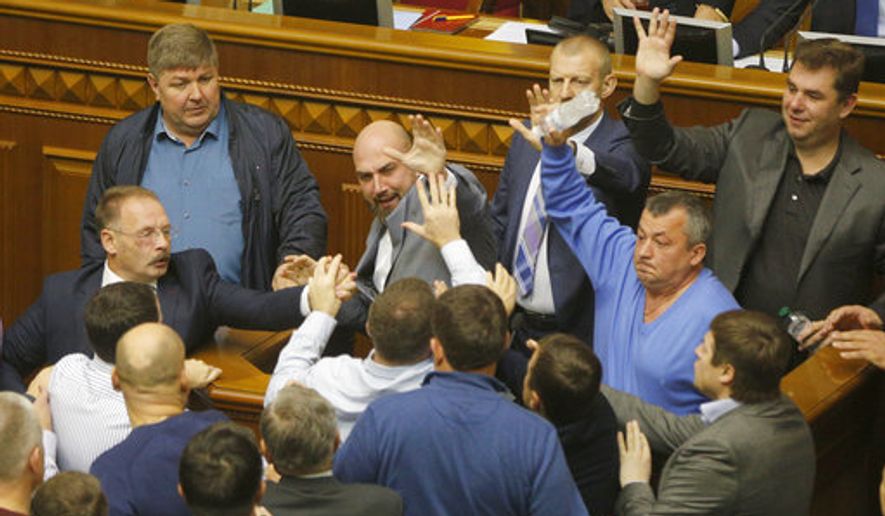OPINION:
Two years ago in Kiev, I met with Artem Sytnik and his colleagues at the National Anti-Corruption Bureau, along with the Specialized Anti-Corruption Prosecutor’s Office, of Ukraine, and wrote a profile headlined, “Can this man save Ukraine?” Mr. Sytnik at the time had just been installed as the head of NABU.
The two newly minted organizations, part of a group of four anti-corruption agencies set up in concert with Western partners, were fresh, shiny entities filled with hope and promise. Young, newly hired prosecutors and detectives roamed the halls, radiating a fascinating yet naive energy to correct their country’s course in preparation for eventual association with the European Union. I wondered at the time what the future would bring. Mr. Sytnik even asked me to return and follow up on the unit’s progress at some point.
To the disappointment of the European Union and American and European diplomats in Kiev, it seems the promise of these organizations has fallen victim to the old ways of the Soviet Union. Anti-corruption efforts in Ukraine are on the brink of collapse.
The image of NABU and its sister service, the National Agency for Prevention of Corruption, have been badly tarnished, possibly irreparably. This is in spite of good funding, good salaries for the employees and support of the West.
No senior Ukrainian government official has been convicted on corruption charges. The NAPC has yet to set up a functioning system to track assets of government officials.
With NABU in particular, high-profile corruption cases have simply been sidelined. Corrupt officials in Ukraine want nothing better than to curb the organization’s work, and it seems they are succeeding.
A perfect example of this is the case of the Privat Group of oligarch Igor Kolomoisky. The state nationalized the PrivatBank to prevent its collapse. However, it was found out later that on the eve of the nationalization, the owners withdrew all the money.
Mr. Sytnik put the losses at approximately $600 million, a massive amount for the national financial system. NABU detectives seized relevant documents, but no action has been taken in the case. Mr. Sytnik has not mentioned the case for over two months. There are rumors of a lucrative secret deal between Mr. Sytnik and Mr. Kolomoisky to keep the case under wraps.
Then there is the case of the large energy company Zaporozhye Oblenergo, one of the first actions initiated by NABU after its creation. The estimate of internal losses resulting from corruption is $12.8 million. Shareholders of the company include the oligarchs, the Surkis brothers, one of whom is the president of the famed Kiev soccer club Dynamo. According to parliamentary member Serhiy Leshchenko, appointments in power companies run by the Surkis brothers are vetted by Igor Kononenko, deputy chairman of the faction loyal to President Petro Poroshenko.
Again, Mr. Sytnik and his office have not mentioned the situation for over six months, blocking the prosecution of one his first high-profile cases. Again, there are whispers of large bribes being paid to stop NABU in its tracks.
Now a public feud between NABU and NAPC has erupted after a review of Mr. Sytnik’s activities was initiated by NAPC. Mr. Sytnik responded by launching a probe of NAPC’s chief, Natalia Korczak. Both sides subsequently hurled confrontations, threats, lawsuits and allegations. As the infighting continues, any momentum to fight corruption in Ukrainian society seems to be lost.
An audio recording has come to light in which Mr. Sytnik disparages NAPC in comments to a colleague. Mr. Sytnik confirmed the conversation took place. NABU also has leaked classified information, causing possible legal problems for the agency and its leader. Calls for Mr. Sytnik’s resignation have begun to be heard, in Ukrainian public circles and in Western embassies in Kiev.
The West may very well push to replace the leadership at NABU with more impartial figures in order to preserve the agency’s future capability, or even existence.
The alleged corruption in the Ukrainian prosecutor general’s office has been widely discussed in Washington, Brussels and Kiev. It now seems the anti-corruption agencies in Ukraine also deserve more scrutiny. The Ukrainian people deserve as much. The fate of future aid from international agencies also rests on Ukraine’s ability to put the legacy of Soviet corruption behind it.
I wonder if that invitation from Mr. Sytnik still stands.
• L. Todd Wood is a former special operations helicopter pilot and Wall Street debt trader, and has contributed to Fox Business, The Moscow Times, National Review, the New York Post and many other publications. He can be reached through his website, LToddWood.com.




Please read our comment policy before commenting.